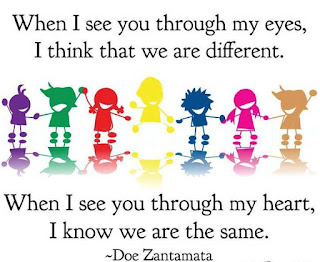Bias based
on physical disabilities or characteristics, or ableism, is any attitude,
action, or institutional practice that subordinates people because of a
disability or other physical characteristic. (Laureate Education) I can recall
a time where I was at a basketball game with my three nephews and
sister-in-law. While sitting in the bleachers, we saw a young man that appeared
to have down-syndrome, come sit beside us. The young boy began shouting,
cheering and clapping along with his parents. My youngest nephew started to
stare at the young man out of curiosity. The next thing that I can remember is
him pointing at the young boy and asking his mother, “ma, what’s wrong with
that boy right there?” My sister-in-law responded, “Who?” and my nephew responded,
“RIGHT THERE!” pointing again, with a smirk on his face as if he wanted to
laugh. By that time, the parents noticed that my nephew was pointing at him and
so did the young boy as well. Although the parents looked slightly angry, the
young boy actually smiled at us. My nephew got scolded by his mother and made
him leave the game and took him home.
Being that my nephew was only seven
at the time this incident occurred and may have actually had a question that he
needed clarity on, I honestly do not think that his mother handled the
situation in a correct manner. My sister-in-law seemed as if she was more embarrassed
on her end and did not want to be in the presence anymore, along with my
nephew. After they left the game, I leaned over and apologized to the parents
of the young boy and asked if they mind if he sat with us. After the parents
accepted the apology, the young boy came and sat with us, I bought him popcorn,
and he and my other two nephews enjoyed the rest of the game. By me taking
action to attempt to resolve this issue, I felt better about myself and for the
young boy because I knew at that time that we are all different in some way
from one another.
I believe that an anti-bias educator
would have pulled my nephew to the side and explained the young boy’s uniqueness
and inform him to not point out people’s differences from him in public, by
fostering leadership of targets (Harro 2010). Understanding that children do
not yet understand that there was practically nothing “Wrong” with the child,
but just not the same as him, I think that the anti-bias educator could have
made an impact out that situation that would have changed his perspective of
diversity for the rest of his life.
References
Harro, B. (2010). The cycle of
Liberation. In M. Adams, W. Blumenfeld, C. Castaneda, H. W.
Figure 7.1 on p. 53

Diedra,
ReplyDeleteThank you for sharing your story. It is difficult to children to understand why others are different. It is our job as adults to help them through this process. I can understand why your sister-in-law was embarrassed. She may not have handled in a manner which was anti-biased, but I am thankful she did try to teach her child a lesson instead of encouraging his negative behavior. It sounds like you were a great example to your nephews though! Thanks for making a difference.
Jennifer
Hi Diedra
ReplyDeleteIt is very understandable for a child to look at another, who appears different to them, that they have never seen before. I also believe that your sister-in-law handled the situation wrong and should have pulled him to the side and talked to him as you suggested. I love the fact that you invited the boy to join you and your other nephews and they were able to enjoy his company.
Diedra,
ReplyDeleteThanks for sharing your story. It is normal for children to point and ask questions. As parents, we should pay attention and listen to questions that children ask. I agree that your sister-in-law handled the situation wrong. There was nothing to be embarrassed about and no reason to leave the game. I think that you handled the situation great by apologizing and allowing the young boy to enjoy the games with you guys.